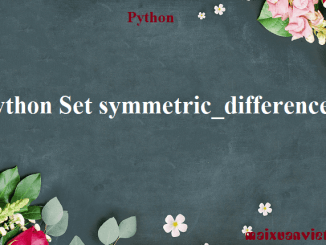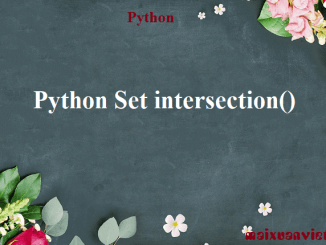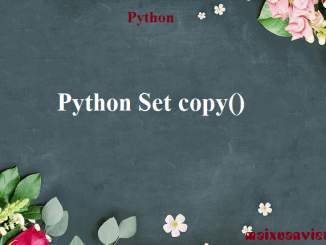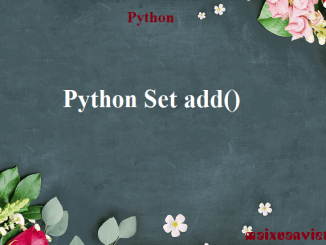
Python Set symmetric_difference()
The Python symmetric_difference() method returns the symmetric difference of two sets. The symmetric difference of two sets A and B is the set of elements that are in either A or B, […]

The Python symmetric_difference() method returns the symmetric difference of two sets. The symmetric difference of two sets A and B is the set of elements that are in either A or B, […]

The pop() method removes an arbitrary element from the set and returns the element removed. The syntax of pop() for sets is: 1. pop() Parameters The pop() method doesn’t take any […]

1. Overview The issuperset() method returns True if a set has every elements of another set (passed as an argument). If not, it returns False. […]

1. Overview The issubset() method returns True if all elements of a set are present in another set (passed as an argument). If not, it […]

The isdisjoint() method returns True if two sets are disjoint sets. If not, it returns False. Two sets are said to be disjoint sets if […]

The intersection_update() updates the set calling intersection_update() method with the intersection of sets. The intersection of two or more sets is the set of elements […]

In this tutorial, we will learn about the Python Set intersection() method with the help of examples. The intersection() method returns a new set with elements that […]

The discard() method removes a specified element from the set (if present). The syntax of discard() in Python is: 1. discard() Parameters discard() method takes a single element x and […]

The difference_update() updates the set calling difference_update() method with the difference of sets. If A and B are two sets. The set difference of A and B is a set of elements that […]

1. Overview The difference() method returns the set difference of two sets. If A and B are two sets. The set difference of A and B is a set of elements that exists […]

The clear() method removes all elements from the set. The syntax of clear() method is: 1. Set clear() Parameters clear() method doesn’t take any parameters. 2. Return value […]

The copy() method returns a shallow copy of the set. A set can be copied using = operator in Python. For example: The problem with copying the set in […]

In this tutorial, we will learn about the Python Set add() method with the help of examples. The add() method adds a given element to a set. […]

In this tutorial, we will learn about the Python Set remove() method with the help of examples. The remove() method removes the specified element from the set. […]

In this tutorial, we will learn about the Python List clear() method with the help of examples. The clear() method removes all items from the list. Example […]

In this tutorial, we will learn about the Python List copy() method with the help of examples. The copy() method returns a shallow copy of the list. […]

In this tutorial, we will learn about the Python sort() method with the help of examples. The sort() method sorts the elements of a given list in […]

In this tutorial, we will learn about the Python List reverse() method with the help of examples. The reverse() method reverses the elements of the list. Example […]

In this tutorial, we will learn about the Python List pop() method with the help of examples. The pop() method removes the item at the given index […]

In this tutorial, we will learn about the Python List count() method with the help of examples. The count() method returns the number of times the specified […]
